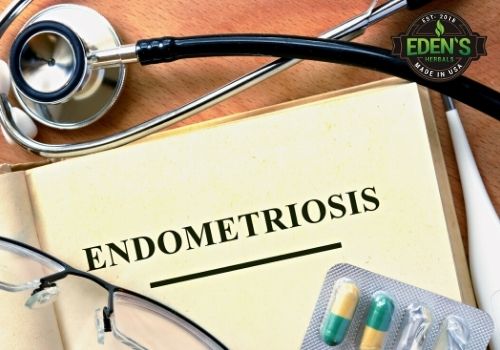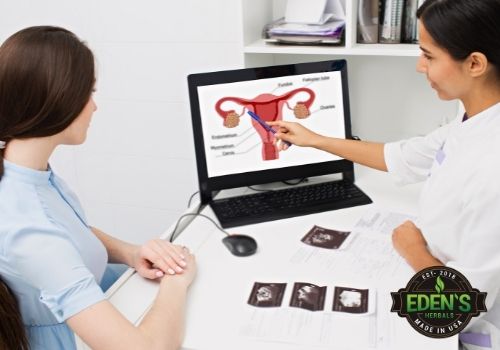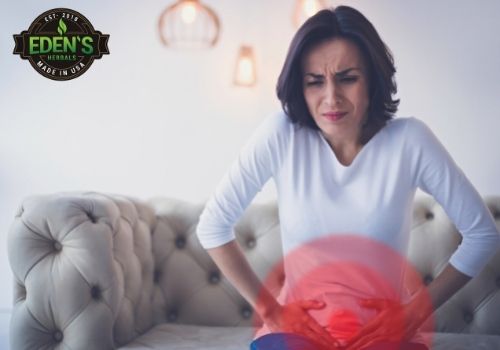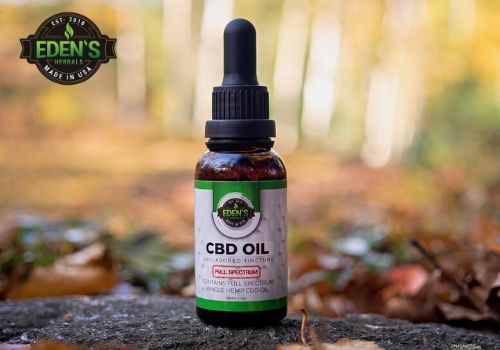 Few things can impact the quality of life more than the painful condition known as endometriosis. Not only can endometriosis cause pain, but psychological anguish and fatigue as well.
Few things can impact the quality of life more than the painful condition known as endometriosis. Not only can endometriosis cause pain, but psychological anguish and fatigue as well.
Worse yet, there is no medical cure for the estimated 10% of women who suffer from this disease.
Good news is on the way for women seeking endometriosis therapy. CBD has emerged in recent years as a promising treatment option for many diseases. A few of these include Multiple Sclerosis, Arthritis, and Epilepsy, to name a few.
New research suggests Cannabidiol offers promising therapy and pain relief for women living with this.
In this article, we'll look at how CBD is changing the game of treatment options, as well as the following:
1. What Is Endometriosis?
2. How Does CBD Help With Endometriosis?
3. Other Treatment Options
4. Which Type of CBD Should I Take for Endometriosis?
1. What Is Endometriosis?
Defined as the presence of endometrial glands in regions other than the uterine cavity. These include the ovaries and rectovaginal septum.
 The predominant feature associated with the condition is pelvic pain. Along with that are fatigue and mental distress.
The predominant feature associated with the condition is pelvic pain. Along with that are fatigue and mental distress.
Three Different Types of Pain To Understand
To better understand endometriosis pain, it's helpful to break it into three categories. Below are the three afflictions related to endometriosis.
Nociceptive Pain: Nociceptors are peripheral nervous system receptors. When activated by noxious stimuli, like endometriosis, "microenvironmental inflammatory response increases and pain is generated".
Inflammatory Pain: Endometriosis is considered a chronic inflammatory disease. Hormonal and PF changes can lead to an environment of hypersensitivity and inflammation.
Neuropathic Pain: This type of pain is often caused by an injury or infection to the area. These pain signals are sent to the central nervous system (CNS), so many describe it as "shooting pain."
Psychological Effects of Endometriosis
Apart from pain, there are psychological issues related to endometriosis. Every sufferer will experience different levels of psychological effects. This is due to different environmental and personal factors.
 Women with endometriosis in their childbearing years have reported anxiety. "Due to exaggerated negative response in the anticipation of pain that, in turn, amplify the pain experience."
Women with endometriosis in their childbearing years have reported anxiety. "Due to exaggerated negative response in the anticipation of pain that, in turn, amplify the pain experience."
Further reports state that endometriosis hurts self-esteem and relationships. This has a cascading effect by worsening the physical pain.
2. How Does CBD Help With Endometriosis?
Recent studies have shown how CBD interacts with endometriosis. Known as the ECS, or Endocannabinoids, these receptors respond to CBD in a way that minimizes pain.
It is shown that pain receptors associated with endometriosis respond well to CBD. They also help with the maintenance and recurrence of the disease.
What is the ECS?
To understand how CBD helps with endometriosis, first, you need to understand the ECS. The ECS is a group of cannabinoid receptors located in the brain, the CNS, and nervous system.
The ECS regulates pain, appetite, mood, and many other physiological attributes. When introduced to CBD, two types of cannabinoid receptors were triggered: CB1 and CB2.
CB1: These receptors are highly expressed in the uterus and many non-reproductive tissues.
CB2: These receptors favor the immune system and intestines, as well as:
- the lungs
- uterus
- skin
- pancreas
Association of ECS and Endometriosis
 Recent studies have suggested that endometriosis is an 'endocannabinoid deficiency' condition. This would explain the pain that comes with the disease.
Recent studies have suggested that endometriosis is an 'endocannabinoid deficiency' condition. This would explain the pain that comes with the disease.
Scientists analyzed CB1 and CB2 in endometriosis pain. They found these receptors were deficient in women carrying the disease.
Further studies showed consensus that cannabinoids have antiproliferative effects on endometriosis.
3. Other Treatment Options
It is important to be aware of other treatment options for endometriosis. Below are the most common treatment options other than CBD.
Hormonal Treatment: This therapy includes, progestin, birth control, and gonadotropin-releasing hormone (Gn-RH).
These can be very hard on the body. Side effects include:
- nausea
- mood swings
- headaches
Anti-Inflammatories (NSAIDs): These are the most common treatment method for endometriosis. Because endometriosis often flares up during menstrual cycles, NSAIDs can be impractical.
Additionally, studies have shown that anti-inflammatories are not effective at reducing endometriosis-induced pain.
Laparoscopic Surgery: This is an invasive procedure that removes the endometrial tissue. You will want to weigh out the risks of going under the knife.
Some patients' endometrial implants also grow back, causing further pain and inflammation.
4. Best Types of CBD To Take for Endometriosis
 The great news is that there are fantastic CBD products available online. CBD can help reduce pain and inflammation, as well as it is convenient and safe to use.
The great news is that there are fantastic CBD products available online. CBD can help reduce pain and inflammation, as well as it is convenient and safe to use.
CBD Tinctures: Tinctures, or CBD oil, is the fastest, most effective way to get CBD into your system. dd a few drops to your favorite drink or place them under your tongue for optimal delivery.
CBD Isolate: While most CBD products contain no more than 3% THC, some may prefer a no-THC alternative. CBD isolate is 99% pure CBD and contains no THC and is scentless and flavorless.
CBD Lotions and Salves: These are simple options for direct contact relief. You can even take a CBD lotion with CBD oil for optimal pain relief.
CBD Gummies: More popular than ever, CBD gummies are a convenient, and tasty way to get all your CBD therapy at once.
Many lose out by not researching before investing in their health. Evidence suggests that CBD may be a beneficial aid to fighting pain and inflammation. Making it a great option for those who suffer from endometriosis.
Everyone is different with what works best for them. Make sure you do your research to ensure you are finding the best CBD product for endometriosis!
If you want to learn more about CBD for Endometriosis, contact Eden's Herbals at support@edensherbals.com today!
*These statements have not been evaluated or approved by the Food and Drug Administration and are not intended to diagnose, treat or cure any illness. Medical advice should be taken from a medical professional.
All of the articles on this site are written by 3rd party content providers, expert bloggers or doctors not directly affiliated with Eden's Herbals.
Individuals should learn the risks and side effects prior to taking CBD. Make sure to always check with a medical professional before starting any new CBD treatment or medication that is not FDA approved.


